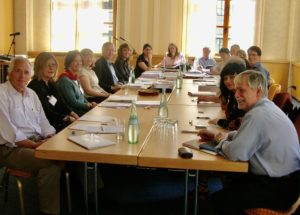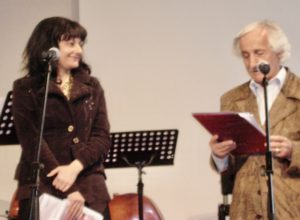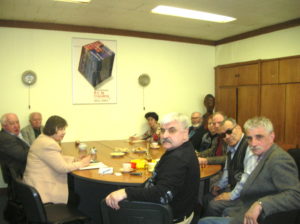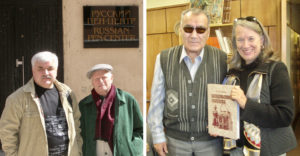Posts Tagged ‘Rakhim Esenov’
PEN Journey 40: The Role of PEN in the Contemporary World
PEN International celebrates its Centenary in 2021. I’ve been active in PEN for more than 30 years in various positions and now as an International Vice President Emeritus. With memories stirring and file drawers of documents and correspondence bulging, I am a bit of a walking archive and have been asked by PEN International to write down memories. I hope this personal PEN journey will be of interest.
At the end of September 2005 a Danish newspaper published 12 editorial cartoons which depicted Mohammed in various poses as part of a debate over criticism of Islam and self-censorship. Muslim groups in Denmark objected, and by early 2006 protests, violent demonstrations and even riots erupted in Muslim areas around the world. The offense was the “blasphemy” of drawing Mohammed in the first place and the particular mockery of some of the depictions in the cartoons.
The uproar over the Jyllands-Posten Mohammed cartoons quickly drew PEN into the controversy, first through Danish PEN and then through the International PEN office and other PEN Centers. PEN included many Muslim members and numbers of centers in majority Muslim countries. All PEN members and centers endorse the ideals stated in the PEN Charter. However, the third and fourth articles of the Charter which addressed the situation, also at times appeared to contradict each other:
Article 3: “Members of PEN should at all times use what influence they have in favour of good understanding and mutual respect between nations and people; they pledge themselves to do their utmost to dispel all hatreds and to champion the ideal of one humanity living in peace and equality in one world.”
Article 4: “PEN stands for the principle of unhampered transmission of thought within each nation and between all nations, and members pledge themselves to oppose any form of suppression of freedom of expression in the country and community to which they belong as well as throughout the world wherever this is possible. PEN declares for a free press and opposes arbitrary censorship in time of peace. It believes that the necessary advance of the world toward a more highly organized political and economic order renders a free criticism of governments, administrations and institutions imperative. And since freedom implies voluntary restrain, members pledge themselves to oppose such evils of a free press as mendacious publication, deliberate falsehood and distortion of facts for political and personal ends.”

PEN International Board and Staff 2006. L to R: Eric Lax (PEN USA West), Elizabeth Nordgren (Finish PEN), Jane Spender (Programs Director) Sara Whyatt (Writers in Prison Committee Director), Eugene Schoulgin (Norweigan PEN), Caroline McCormick Whitaker (Executive Director), Karen Efford (Programs Officer), Joanne Leedom-Ackerman (International Secretary), Jiří Gruša (International President), Judith Rodriguez (Melbourne PEN), Britta Junge-Pederson (Treasurer), Judith Buckrich (Women Writers Committee Chair), Chip Rolley (Search Committee Chair), Sylvestre Clancier (French PEN), Sibila Petlevski (Croatian PEN), Peter Firkin (Centers Coordinator) [not pictured: Mohammed Magani (Algerian PEN), Karin Clark (WiPC Chair), Kata Kulavkova ( Translation and Linguistic Rights Chair)

Peace Committee program 2006. Sibila Petlevski (Croatian PEN), Veno Taufer (Peace Committee Chair)
At the Peace Committee conference that April, I observed, “The Charter of PEN asserts values that can appear contradictory, but represent the dialectic upon which free societies operate and tolerate competing ideas…In our 85th year, International PEN still represents that longing for a world in which people communicate and respect differences, share culture and literature, and battle ideas but not each other.”
The Danish cartoon controversy led off 2006. For me, the PEN year also included attending the conferences of three of PEN’s four standing committees—the Peace Committee in Bled, Slovenia, Writers in Prison Committee in Istanbul, Turkey (PEN Journey 35) and Translation and Linguistic Rights Committee in Ohrid, Macedonia (PEN Journey 39)—and in May the 72nd PEN World Congress in Berlin, and later a Danish Conference on the Middle East in Copenhagen, the Gothenburg Book Fair in Sweden, a PAN Africa Conference in Dakar, Senegal and a trip to Moscow, where I went to watch my oldest son compete in the European Wrestling Championships and visited Russian PEN on a mission.

Russian PEN members meeting in Russian PEN office, including Alexander Tkachenko, General Secretary, 2006
To Moscow I took just under $10,000 raised by PEN centers and buried in my luggage to help the Russian PEN Center. Vladimir Putin and the Russian government had begun to crackdown on nongovernmental organizations with ties to other countries. One of their first targets was Russian PEN which had opposed the legislation restricting nongovernmental organizations. At the time I was also on the board of Human Rights Watch, a larger organization which was watching closely what was happening to PEN. The government’s attack on Russian PEN came in the form of a freeze on all assets for failure to pay a land tax. Russian PEN argued that it was a legal tenant where it had been conducting business and was not liable for the tax on the land, but the tax office refused to drop the charges. The government threatened to close PEN and take away its office if the money wasn’t paid. An appeal had gone out to PEN’s other centers, which had responded from around the globe not only with protests to Moscow but also with funds for Russian PEN.
I brought in funds just under the amount I would have had to declare. During the wrestling tournament I met with Alexander (Sascha) Tkachenko, the General Secretary of Russian PEN, and delivered to him the donation, and he gave me a receipt. The funds stayed off the crisis for then. Charges were dropped. A Russian Minister said, “I don’t understand. I was getting letters from as far away as Argentina!” Sascha answered him: “That is the kind of organization we are.” PEN continued to operate.
In Moscow I also met with Russian PEN members as well as with Turkmen author Rakhim Esenov, who was visiting Russian PEN. I had met Esenov a few weeks before in New York where he had won PEN America’s Barbara Goldsmith Freedom to Write award. In Turkmenistan Esenov had been charged with “inciting social, national and religious hatred using the mass media” because of characters in his novel The Crowned Wanderer. Set in the 16th century Mogul Empire, the story focused on a poet/philosopher/army general who was said to have saved Turkmenistan from fragmentation. The president of Turkmenistan Saparmurad Niyazov banned the book for portraying the main character as a Shia rather than a Sunni Muslim, and he imprisoned Esenov for several months. I still have the massive Russian language volume he shared with me, a work that had taken him years to write.

L to R: Russian PEN General Secretary Alexander (Sascha) Tkachenko and Russian PEN member outside Russian PEN office in Moscow and Rakhim Esenov, author of The Crowned Wander and Joanne Leedom-Ackerman (PEN International Secretary), 2006
At the Peace Committee conference earlier that month I’d presented a paper on the conference theme “The Role of PEN in the Contemporary World,” a broad and challenging topic which had inspired me to peer both backward and forward.
Below is the beginning of that paper with a link to the rest:
My first memory of a PEN meeting was sitting in someone’s living room in Los Angles writing postcards to free Wei Jingsheng from prison in China. At the time in the 1980’s he’d already been in prison several years of a fifteen-year sentence. I had no idea who this writer was thousands of miles away. I barely knew the other writers in that living room. On the coffee table would have been PEN’s Case List, which at the time was white sheets of paper stapled together.
We wrote and stamped our post cards for Wei and other writers that afternoon. I’m sure we were provided with background on his case. I pictured these cards fluttering into a jail somewhere in China and perhaps even into the cell of this stranger to let him know we had taken note of him and cared what happened. Looking back on the blue-sky afternoon as we sipped sodas and ate crackers and cheese, I see our act as a bit fleeting, an effort to imagine the fate of another writer who didn’t have our freedom to write and speak…[continue reading here]
Next Installment: PEN Journey 41: Berlin—Writing in a World Without Peace